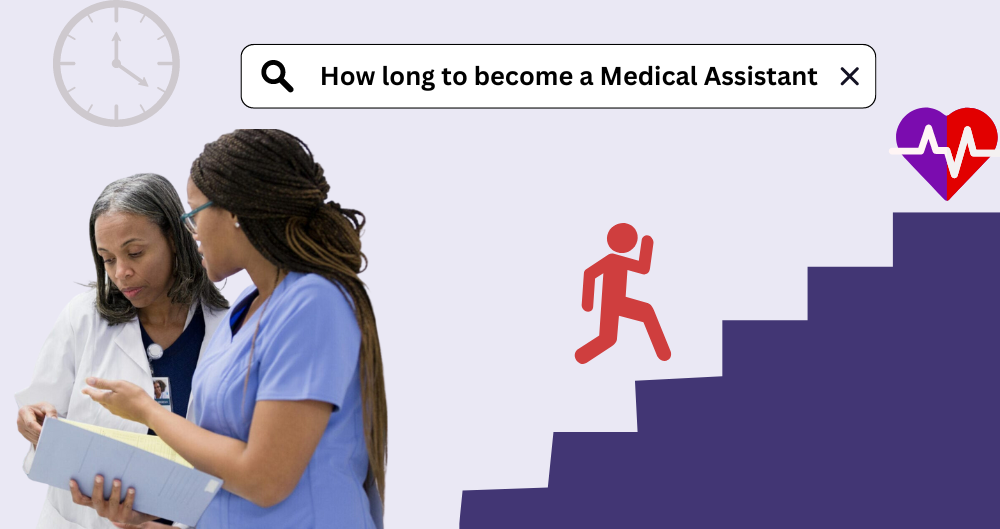What are the different ways I can take, and how long will it be?
There are several paths you can take to become an MA. You don’t have to be certified unless you’re from Washington–no other states require it. The beauty of this profession lies in the multitude of pathways available to aspirants. Let’s delve into the various routes you can take to embark on your journey as an MA.
-
Online Program - If you plan to take an MA class through an online course, it can be four to nine months in duration. Though it can be as fast as eight weeks if you undergo an accelerated program. This course will cost around $2,000 - $5,000, depending on the program you choose. You'll learn about essential topics such as clinical medicine and administrative assisting. If you pursue this further, it will lead you to obtain a diploma. Online Medical Assistant classes
-
Certification from trade schools - Obtaining a certification from trade schools can be a minimum of nine months in duration. This program will cost around $5,000 to $15,000, depending on the school and location you enroll in. Since this program is longer and more expensive, you’ll get to learn more competencies essential to landing employment. You will cover topics such as anatomy, clinical medicine, and administrative assisting. This may also allow you to participate in an externship and, if pursued, leads to earning a diploma.
-
Certification from community college - If you’re planning to get certified from a community college, this can be a minimum of 12 months in duration. A program of your choice will cost around $5,000 to $10,000. This program is like a fast-paced higher education program. This path leads to earning a certificate and will quickly land you a job after graduation.
-
Associates degree in Medical Assisting - Becoming an MA through an associate's degree will be two years in duration. This means paying tuition somewhere around $7,000 to $25,000 annually, depending on the school. Through this program, you will spend extensive time covering topics. This includes clinical medicine, anatomy, physiology, and administrative assisting. You will also learn practical skills in your lab classes and during your externship. Completing this leads to having an associate's degree. But the program may also help prepare you to take a certification exam to become a Certified Medical Assistant (CMA). Compared to an MA certificate program, you may take more general classes such as English, Mathematics, Biology, and more.
Do I need to get certified to become a medical assistant?
Even if your state might not need you to, employers generally prefer applicants with certifications. Organizations such as the National Healthcareer Association, American Medical Technologists, and the American Association of Medical Assistants offer MA certifications. Passing the examination offered by these organizations leads to obtaining various certifications. This is optional but comes in handy if you are aiming for a boost in your healthcare career.
The duties of a Certified MA have the same job responsibilities as a regular MA but with better pay. Most physicians choose to hire CMAs because there is a guarantee that they have the skills and knowledge in patient care. CMAs often earn 10% more than MAs while having a similar practice area and workload. The pay and areas of practice for Registered Medical Assistants (RMAs) and CMAs are very similar.
Certified Clinical Medical Assistants (CCMAs) specialize more in clinical tasks than administrative ones. MA certifications might increase your chances of landing a job or a salary raise, even if they are not required. In the hopes of becoming a CMA, RMA, or CCMA, this will give you beneficial credentials such as:
-
More competitive resume than other applicants
-
Possibly higher pay of salary
-
More skills and experience credibility
-
Better education for patient care and responsibilities and
-
More opportunities for career advancement
Pros and cons of choosing a specific MA path
Some individuals thrive in an interactive learning environment where they can collaborate and engage with their classmates. When opting for an in-person program, it's common for the duration to be a little longer compared to online or accelerated options. This extended duration allows for comprehensive coverage of the curriculum. Students will have ample time to grasp the core concepts and develop a solid foundation in medical assisting.
On the other hand, MA schools tend to be pricier than other options. This is particularly true when the program is from private institutions that have higher tuition. The investment required for attending an MA school can be a significant factor to consider in your decision-making. If you are seeking to enter the workforce asap, these types of programs may not be the most suitable option for you.
In such cases, exploring alternative paths might be more aligned with your goals and aspirations. Note that you can be an MA without certification and only work experience. The decision to pursue a program at a school or explore other alternatives depends on your individual circumstances. Check out our other blogs, such as MA vs CNA, PCT vs MA, and phlebotomist vs MA, to learn more about comparisons to other options.
Medical assistant programs can vary in length, typically ranging from 9 months to 2 years. The duration depends on factors such as the program type (certificate, diploma, or associate degree), full-time or part-time enrollment, and the specific curriculum requirements.
Choosing the right path for your MA education is a crucial step in setting yourself up for success in this rewarding healthcare career. The decision you make will not only impact your knowledge and skills but also influence your future opportunities and professional growth. Regardless of the duration of becoming an MA, I’m sure that you will be an amazing addition to the industry!





